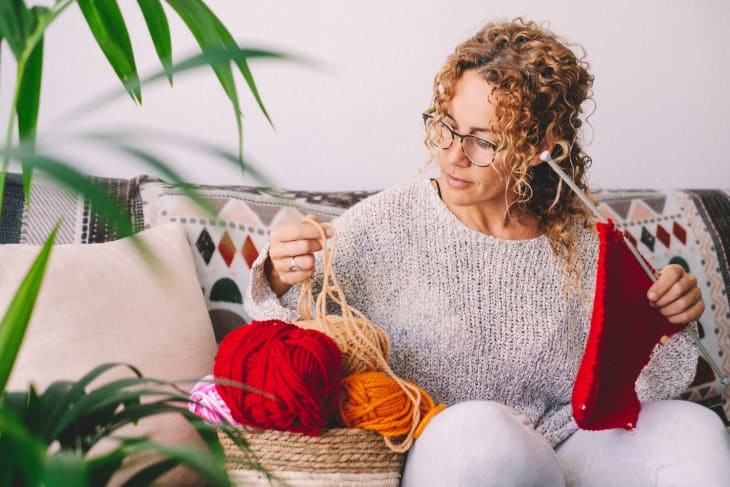Put Down the Knitting Needles, If You Want To — Here’s Why It’s OK to Abandon a Hobby

There’s a spiral-bound sketchbook on my dresser. It’s blank except for one drawing of my bulldog, Frankie, on the first page. A few feet away is a partially assembled cabinet that I gave up on when I couldn’t get the doors level. Perhaps, like me, you spent the early days of quarantine trying a new hobby or restarting an old one.
Hobbies like jigsaw puzzles, baking banana bread, or making macrame plant hangers provided an escape from the stress of pandemic life, and they allowed people a chance to master new skills and reconnect with their creative sides.
But as time passed, some of these hobbies began to feel more anxiety-provoking than relaxing. If you’ve been haunted by the ghosts of your pandemic hobbies, you’re not alone, and you’re not a failure. Here’s why it’s actually completely okay to abandon a hobby — and how to do it.
Try not to overthink it.
As a child, being creative was effortless. I could spend the morning designing furniture for my dollhouse and the afternoon painting neon flowers. In 2020, when I found myself doodling during Zoom meetings, it seemed natural to revisit my earliest hobby. I thought a new sketchbook would help me feel inspired, but it had the opposite effect.
I stared at a blank page for days, finally landing on a sketch of my dog. I even posted it to Instagram with a caption about the comfort of returning to a treasured pastime. Initially, doodling had been a welcome distraction but now it felt forced, like yet another task on my to-do list.
As Dr. Daryl Appleton, a New York City-based psychotherapist, explains, hobbies are about relieving “boredom and having control over the uncontrollable.” She says, “Sometimes we outgrow them. Other times we come back to them.” When we start overthinking them, hobbies can feel more like a burden than an escape.
Save your energy for something you enjoy.
“There’s less time and physical and emotional energy to do all the ‘fringe’ things we did to get us through the pandemic,” Appleton says. She suggests asking yourself: Does my hobby provide an opportunity to explore a new skill set or connect with people who share my interests or values?
If the answer is no or if you’re overwhelmed with other obligations, putting your limited energy toward a hobby can leave you feeling depleted and isolated. Life is busier now with more opportunities to travel or attend events like concerts and weddings. “When a hobby interferes with your basic needs to survive, it becomes a chore,” Appleton explains. “Remember hobbies are meant to be fun.”
Let go of the idea that quitting means you’re a failure.
“Making an active choice to put your hobby aside or reallocate your energy to something else is a wonderful way to be intentional about your bandwidth, time, and energy,” Appleton says. Right now, attending to anything beyond your basic needs might exceed your bandwidth. If you’re, say, living with a partially renovated bathroom, you might need to prioritize getting the sink up and running before picking out decorative tile and lighting.
“There are so many other things to put your energy toward besides beating yourself up over a ‘hobby fail!’” Appleton says. Quitting doesn’t make you a failure nor does it signal a blow to productivity. Instead, abandoned hobbies might be a barometer for growth — and an opportunity to return to leisure that’s actually joyful and restorative.